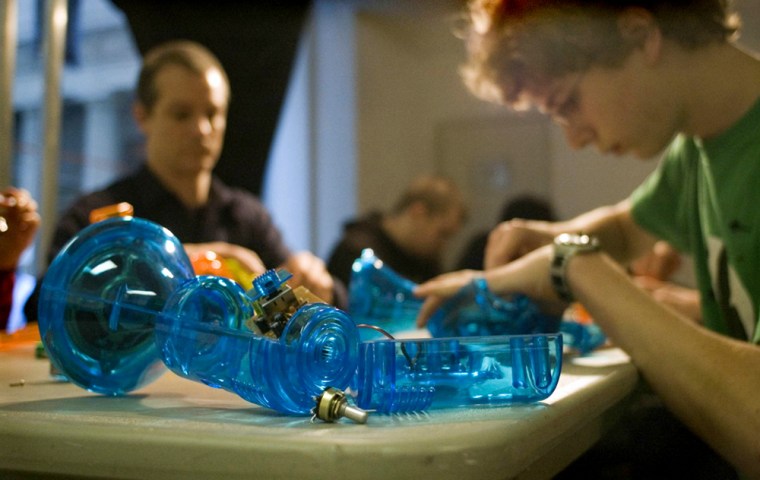The robot monkeys prepared to do battle as two dozen cracked-open toy pianos bleated a symphony of mutated children's songs. Enterprising geeks prodded the toys' exposed innards with alligator clips, soldering irons, and potentiometers.
Bent 2006, a "circuit bending" festival, was underway. Clearly, there were no adults in charge.
Part performance art, part basement science, circuit bending is the creative rewiring of battery-powered electronics, ranging from Game Boys to Speak-n-Spells to talking teddy bears.
Bent's third annual festival, at the Lower Manhattan Cultural Council's Swing Space, spanned performances, installations, and workshops. Hundreds of attendees streamed through the former bank, including participants from England, Germany, Italy, and Japan.
"I believe that a circuit bent instrument has a new synapse," said Reed Ghazala, the recognized father of circuit bending. As an Ohio teenager in the mid-1960s, Ghazala accidentally shorted out a Radio Shack amplifier when its open back brushed against something metallic in his desk drawer.
"A lot of people parallel circuit bending with vivisections or some kind of horrible surgery," the 52-year old hippie polymath said, "but instruments learn new languages. It's not a negative thing."
The languages of the Bent diaspora are remarkably varied. Loud Objects, the trio who opened last week's festival, elegantly brought a circuit to noisy life on an overhead projector. Shotaro Nakano of Japan, meanwhile, modified a breathalyzer test into a new kind of wind instrument. Slugging beer, he blew into the device, the sound morphing with the alcohol on his breath.
In the context of Bent, the use of drums and bass by Minneapolis's Mystery Palace, a raw indie rock trio who employed modified keyboards, was positively radical.
"I don't think of it as a genre. It's a type of instrumentation," said Mike Rosenthal, 27, the event's unflappably mellow camp counselor. He co-founded Bent with Daniel Greenfeld, also 27, in conjunction with The Tank, a TriBeCa arts space.
"Sometimes, it's nice to reach out and touch a sound," writes Nic Collins in the introduction to his recently published "Handmade Electronic Music," which joins Ghazala's "Circuit-Bending" in the growing circuit-bending library. Both emphasize the approach's minuscule learning curve, demonstrated by a Bent children's workshop.
"This makes some pretty cool noises already," enthused Benjamin Goldstone, a mulleted Englishman, holding up a frog-shaped toy phone to a dozen wide-eyed adolescents, "but I reckon it'll make some wicked noises when we get it open."
Daniel Glus, 7, pressed his finger against a transistor. "It sounds like a radio show on fast forward!" he exclaimed. Some made the same frogs sound like wailing police sirens, while others created a glitchy dance beat.
Daniel's father, Peter, a civil water engineer, set his sights on "the most annoying toy in the house," a bleeping clown-pushed wagon, which he'd brought with him. Daniel vetoed the idea before his father could pry it open.
Despite an eBay price run on Speak-n-Spells, considered the apex of bendable analog circuitry, Ghazala says, "today is the best (time) I've seen for circuit bending." There's a robust international scene, bolstered by thriving Internet communities. Goldstone, 30, who performed at the festival under the name George Lazenbleep, traveled from England to participate and documented the festival for an Australian radio station.
Around the space, installations demonstrated the idea's breadth. The robot monkeys, the brainchild of toy sculptor and lighting technician Dan Walker, 32, received the most enthusiastic response. Players yawped in delight as they pitted the remote control Frankensteins in soccer matches while Walker released miniature Godzillas and other distractions onto the playing field.
As companies like Apple and Sony continually restrict users' rights with digital rights management systems, circuit bending is a powerful reminder that consumers can do what they wish with consumer electronics _ even if it means breaking them.
While the instruments haven't yet had their "RockIt," the 1983 Herbie Hancock hit that propelled turntables to the mainstream, it might not be far away: Nine Inch Nails' leader Trent Reznor recently invited Ghazala backstage for a consultation.
For now, circuit bending remains non-commercial, but the seeds have been planted. Daniel promised to go home and have a go at his toys: "I never knew you could make so much noise!"
